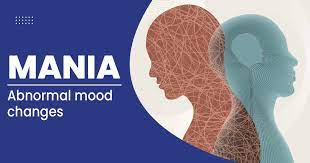Mania
 Mania is a mental health condition characterized by an elevated and persistently irritable mood, increased energy levels, and impulsivity. It is a defining feature of bipolar disorder, specifically bipolar I disorder, where individuals experience episodes of mania alternating with periods of depression.
Mania is a mental health condition characterized by an elevated and persistently irritable mood, increased energy levels, and impulsivity. It is a defining feature of bipolar disorder, specifically bipolar I disorder, where individuals experience episodes of mania alternating with periods of depression.
During a manic episode, individuals often exhibit heightened self-esteem, grandiosity, and a decreased need for sleep. They may engage in risky behaviors such as reckless spending, impulsivity, and increased goal-directed activity. The individual's thoughts may race, leading to rapid speech, distractibility, and difficulty concentrating.
One of the key diagnostic criteria for mania is a noticeable change in behavior that deviates significantly from the person's baseline. Manic episodes can last for a week or longer, and their intensity can vary. In severe cases, individuals may experience psychotic symptoms, including delusions or hallucinations.
The exact cause of mania is not fully understood, but it is believed to involve a complex interplay of genetic, biological, and environmental factors. Imbalances in neurotransmitters, particularly dopamine and serotonin, are thought to contribute to the development of manic symptoms.
Treatment for mania typically involves a combination of medication and psychotherapy. Mood stabilizers such as lithium or anticonvulsant medications are commonly prescribed to help regulate mood swings. Atypical antipsychotic medications may also be used to manage symptoms. Psychotherapy, particularly cognitive-behavioral therapy (CBT) and psychoeducation, can be valuable in helping individuals understand and manage their symptoms.
It is essential for individuals experiencing symptoms of mania, or those who suspect a loved one may be going through a manic episode, to seek professional help promptly. Early intervention and ongoing management are crucial for stabilizing mood, preventing the escalation of symptoms, and improving overall quality of life for individuals with bipolar disorder.
Managing mania requires a comprehensive approach, addressing both the acute symptoms and the long-term management of the disorder. A collaborative effort between individuals, their families, and mental health professionals is often necessary to develop an effective treatment plan tailored to the unique needs of each person experiencing mania.